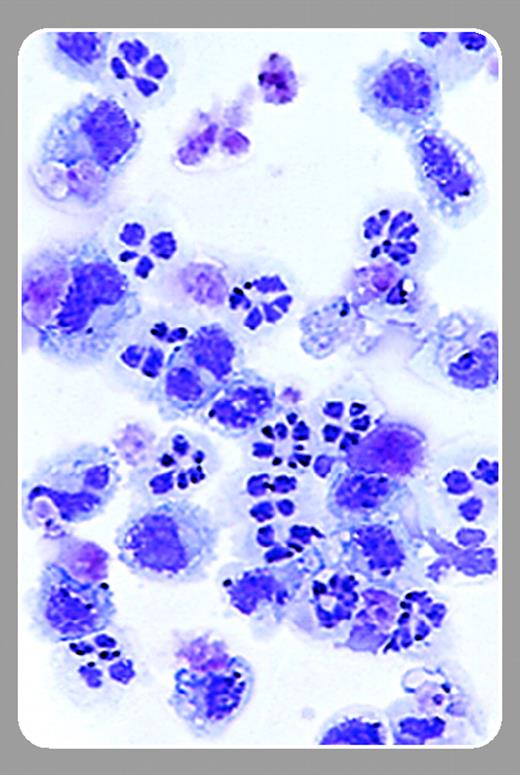The casein kinase I (CKI) serine/threonine kinases are highly conserved among eukaryotes and have been implicated in a variety of processes, ranging from the regulation of DNA repair and cell cycle progression in yeast to the control of circadian rhythm and embryogenesis in mammals. The latter activities are attributed mainly to CKIϵ, one of the 7 mammalian CKI isoforms. CKIϵ has been shown to act as a positive regulator in the canonical Wnt signaling pathway by stabilizing β-catenin.1 The recent discovery that self-renewal of hematopoietic stem cells is controlled by Wnt positions CKIϵ in a regulatory network controlling early cell fate decisions in hematopoietic development.2,3
In this issue of Blood, Okamura and colleagues (page 2997) provide evidence for a more extended role for CKIϵ in hematopoietic differentiation. Using the mouse 32D cell system, they show that CKIϵ levels remain high when cells are kept immature in the presence of interleukin-3, resulting in increased β-catenin stabilization. On the other hand, upon granulocyte colony-stimulating factor (G-CSF)–induced differentiation of the 32D cells, expression of CKIϵ is down-regulated. When CKIϵ is constitutively expressed from a retroviral vector in these cells, neutrophilic differentiation is largely prohibited. Conversely, a kinase-dead form of CKIϵ accelerates G-CSF–induced differentiation. These results suggest that CKIϵ antagonizes G-CSF–controlled neutrophil development in the 32D system. While the contribution of CKIϵ in granulopoiesis under conditions that are more physiologic remains to be established, it is intriguing to speculate how the negative effects of CKIϵ on granulocytic differentiation are mediated.FIG1
One mechanism by which G-CSF controls granulopoiesis is through activation of the signal transducer and activator of transcription 3 (STAT3). Although overexpression of dominant-negative forms of STAT3 prohibits G-CSF–induced differentiation in myeloid cell line models,4,5 studies in a conditional STAT3 knockout model show that STAT3 is not essential for neutrophil development per se, but contributes to the growth arrest that precedes differentiation.6 Typically, mice lacking STAT3 in their hematopoietic cell compartment display hyperproliferative responses to G-CSF treatment, leading to a significantly larger increase in peripheral neutrophil levels compared with wild-type controls. The gene encoding the suppressor of cytokine signaling protein 3 (SOCS3) was suggested to be the STAT3 target gene predominantly responsible for the phenotype of these mice,6 a conclusion that gains strong support from a recent study in a conditional SOCS3 knockout model, in which G-CSF responses are remarkably similar to those of the STAT3-deficient mice.7
Okamura and colleagues show that overexpression of CKIϵ stabilizes SOCS3 by inhibiting its proteasomal degradation. They suggest that the prolonged action of SOCS3 reduces G-CSF–induced activation of STAT3, which in turn leads to the attenuation of differentiation in the 32D model. At first glance this hypothesis cannot be reconciled with the largely overlapping pheno types of STAT3- and SOCS3-deficient mice. However, the regulatory functions of SOCS proteins may be more subtle than predicted by gene knockout or ectopic overexpression models because their activity depends on a variety of factors, including expression levels in a given cell type. Okamura and colleagues observed that, in contrast to STAT3, activation of STAT5 was not affected by CKIϵ. Predictably, this will result in an increased ratio of STAT5 to STAT3 activation, a state that has been associated with increased proliferation and reduced differentiation of myeloid progenitor cells. The authors speculate that the exclusive effect of CKIϵ on STAT3 activation may be related to its higher sensitivity to SOCS3-mediated Jak kinase inhibition compared with STAT5, but another explanation may arise from their intriguing observation that SOCS3 forms a complex with STAT3. Through such binding, SOCS3 (stabilized by CKIϵ) could inhibit transcriptional activity of STAT3 during immature stages of myeloid development, for instance by attenuating translocation of activated STAT3 complexes to the nucleus.
Although a number of questions remain open, the work of Okamura and colleagues provides exciting evidence for a role of CKIϵ in controlling hematopoietic cell fate, particularly in the neutrophilic lineage. It will now be relevant to study the contribution of CKIϵ in other hematopoietic lineages and to investigate its involvement in various hematologic disorders such as myelodysplasia and acute myeloid leukemia.


This feature is available to Subscribers Only
Sign In or Create an Account Close Modal